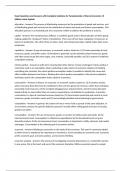Exam Questions and Answers with Complete Solutions for Fundamentals of Macro Economics 15
Edition Latest Update
allocation - Answers The process of distributing resources for the production of goods and services, and
of distributing goods and services for the satisfaction of wants and needs and human consumption. This
allocation process is an essential part of an economy's effort to address the problem of scarcity.
capital - Answers The manufactured, artificial, or synthetic goods used in the production of other goods,
making capital the "produced" factor of production. This is one of four basic categories of resources, or
factors of production. The other three are labor, land, and entrepreneurship. Capital makes labor more
productive.
capitalism - Answers A type of economy, or economic system, based on: (1) Private ownership of most
resources, goods, and other assets; (2) freedom to generally use the privately owned resources, goods,
and other assets to get the most wages, rent, interest, and profit possible; and (3) a system of relatively
competitive markets.
Ceteris paribus - Answers A Latin term meaning that other factors remain unchanged. Ceteris paribus is
commonly used as an assumption when conducting a wide variety of economic analyses. By holding
everything else constant, the ceteris paribus assumption makes it possible to identify the cause-and-
effect relation between two factors. Relaxing the ceteris paribus assumption is the primary analytical
technique used in the comparative statics study of economics.
communism - Answers In theory, an economy, or economic system, based on: (1) A classless society,
where everyone does their best to contribute to the common good, (2) common, rather than individual,
ownership of all resources, (3) the complete disappearance of government, and (4) income allocated
based entirely on need rather than on resource ownership or contribution to production. In practice,
communism is a type of command economy based on: (1) Government ownership and control of most
resources, goods, and other assets and (2) excruciatingly detailed central planning by government.
competition - Answers In general, the actions of two or more rivals in pursuit of the same objective. In
an economic context, the specific objective pursued is usually either selling goods to buyers or buying
goods from sellers.
consumption - Answers The use of resources, goods, or services to satisfy wants and needs. At the
macroeconomic level, consumption is reflected as expenditures by the household sector on gross
domestic product. At the microeconomic level, consumption is important to utility, demand, and market
exchanges. Consumption is the ultimate goal of economic activity.
economic - Answers Relating to economics or the study of the economy. This word is commonly added
to other terms to emphasize its importance to economics. A few examples are economic cost, economic
profit, economic goal, economic policies, and economic thinking.
economic analysis - Answers The process of investigating economic phenomena in a systematic manner.
In one sense, this is the heart and soul of the economic discipline. While economists spend an ample
, time identifying economic concepts, the end result of this discovery process is usually aimed at
combining these concepts in such a way as to evaluate or analyze alternative consequence
economic goal - Answers One of five basic conditions of the mixed economy that is generally desired by
society. We typically divide these five into macro goals (full employment, stability and economic growth)
and micro goals (efficiency and equity).
economic goals - Answers Five conditions of the mixed economy, including full employment, stability,
economic growth, efficiency, and equity, that are generally desired by society and pursued by
governments through economic policies. The five goals are typically divided into the three that are most
important for macroeconomics (the macroeconomic goals of full employment, stability, and economic
growth) and the two that are most important for microeconomics (the microeconomic goals of
efficiency and equity).
economic policies - Answers Government actions designed to affect economic activity and pursue one or
more economic goals. Also called economic policies. The four common types of government policies are:
fiscal, monetary, regulatory, and judicial.
economics - Answers A social science that studies the allocation of limited resources used to produce
the goods and services that satisfy unlimited consumer wants and needs. Economics is one of several
social sciences (others are sociology, political science, and anthropology) which apply the scientific
method to human behavior. The distinguishing feature of economics is a concern with the fundamental
problem of scarcity - unlimited wants and needs and limited resources. Economics is commonly divided
into two branches - macroeconomics and microeconomics.
efficiency - Answers Generating the most possible satisfaction from a given amount of resources.
Efficiency means that this satisfaction of wants and needs cannot be increased by producing more of
one good and less of another. This is one of the five economic goals and one of the two microeconomic
goals. The other goals are full employment, stability, economic growth, and equity.
efficient - Answers The state of resource allocation that exists when the highest level of consumer
satisfaction is achieved from available resources. This state can be accomplished through markets when
the price buyers are willing and able to pay for a good - based on the satisfaction obtained - is equal to
the price sellers need to charge for a good - based on the opportunity cost of production.
entrepreneurship - Answers A special sort of human effort that takes on the risk of bringing labor,
capital, and land together and organizing production. This is one of four basic categories of resources, or
factors of production. The other three are labor, capital, and land.
equity - Answers This has two, not totally unrelated, uses in economics - one of five economic goals and
ownership of an asset. As an economic goal, one of the two microeconomic goals, achieving equity
means that income and wealth are distributed in a fair manner. What is meant by "fair" is subject to
continuing debate. As ownership, equity typically refers to the ownership of a corporation, especially




